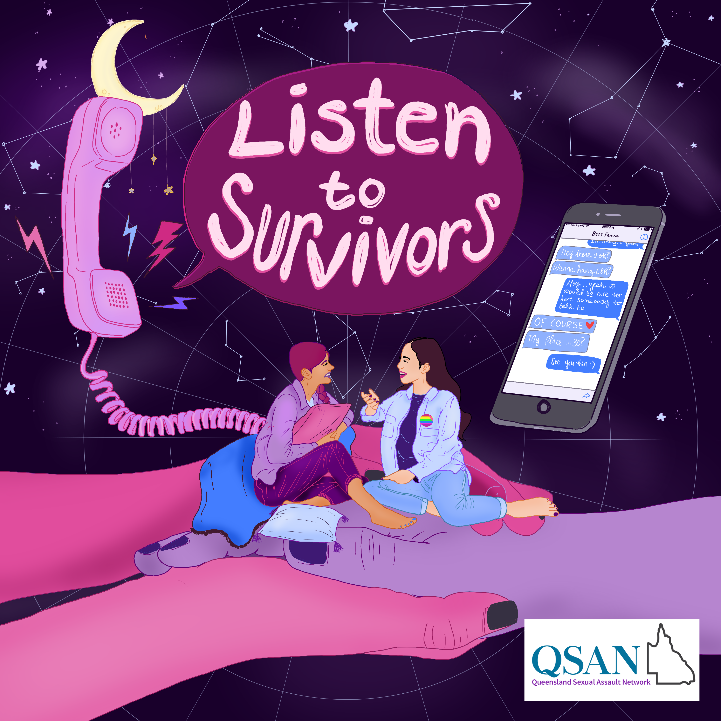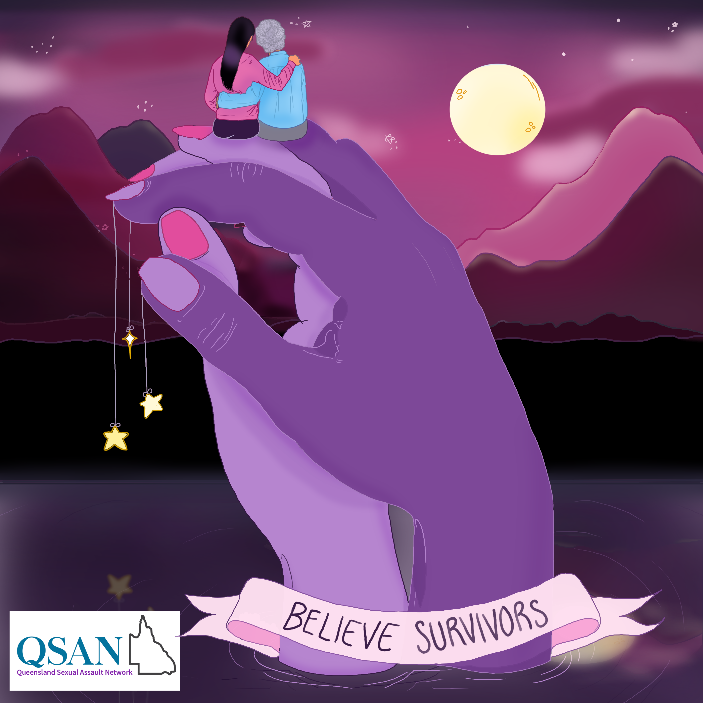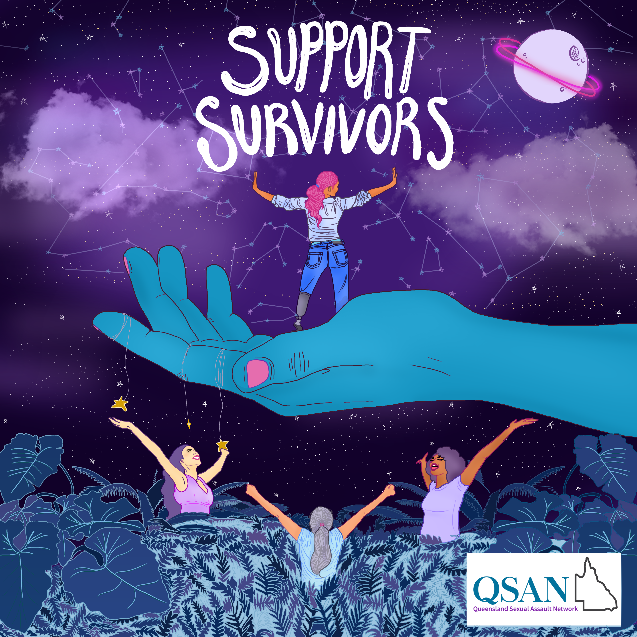Listen to You
‘Listen to You’ was composed by Peppermint Ollie (Olivia) for the QSAN and Sexual Violence Awareness Month, 2019 (SVAM). ‘Listen to You’ promotes the message that survivors of sexual assault shouldn’t have to be afraid of not being believed, which is still a strong issue prevalent in today’s society.
Ollie is a Brisbane based singer and songwriter whose music can be found on Spotify and Apple Music. Her strong online presence with her YouTube channel has led to her writing and performing songs for the CBBC’s television program LifeBabble, as well as being awarded a grant from Advance Queensland. Ollie is passionate about writing music with meaning.
‘Listen to Survivors’

For Sexual Violence Awareness Month 2019, the Queensland Sexual Assault Network has worked with artist and activist, Liberal Jane, to create a series of images inspiring community members to supportively respond to disclosures of sexual violence. If a survivor chooses to tell you that she has experienced sexual violence, she is investing a lot of trust in you. Your responses are important. The first image in the series, “Listen to Survivors” speaks to acknowledging survivors.
Responder tips: When responding to a disclosure, you do not have to be an expert or know all the right things to say. Start by listening carefully to what the person is saying. Let them speak at their own pace, and disclose as much information as they are comfortable sharing. Try not to interrupt or ask lots of questions. You do not need to know all the details – try not to ask for more information about the actual events than is volunteered.
‘Believe Survivors’

The second image in the series, “Believe Survivors” means putting your trust, faith and confidence in survivors.
The theme of SVAM 2019 is ‘We Believe You’. 1 in 5 women experience sexual violence in their lifetime, however, these experiences are vastly under reported. ‘We believe you’ addresses a pervasive cultural attitude in not believing survivors when they disclose their experience of sexual violence. Many survivors have attempted to find justice through reporting and have not been believed. Many women choose not to report or disclose to friends and family due to unhelpful messages from their communities, friends and family, the police and the justice system. Messages include minimising their experience and the trauma they might have sustained and victim blaming – indicating that they might be somehow to blame for a crime committed against them. We know that sexual assault occurs within the context of power, intimidation, coercion and violence – and therefore a survivor’s response and act of resistance in that moment is to just survive – even if that meant acting ‘passive’.
Together we can transform the way we respond to disclosures, work towards changing the narrative and foster a safer community. Together we can call out the institutions that silence and dismiss survivors. It starts by believing and it starts with you.
Responder tips: It can be extremely difficult for survivors to come forward and share their story. They may feel ashamed, fear they won’t be believed, or worried they may be blamed. Leave any ‘why’ questions out – your job is to support this person. Be careful not to interpret calmness or a lack of visible distress as a sign that the event did not occur. Everyone responds to traumatic events differently. The best thing you can do is believe them.
You can say things like:
“I believe you.”
“It took a lot of courage to tell me about this.”
“It’s not your fault.”
“You didn’t do anything to deserve this.”
“Support Survivors”

The third and final image in the series, “Support Survivors” means acknowledging that survivors are the experts in their own lives.
Responder tips: Sexual violence is a violation of consent. Sexual violence is a crime in which perpetrators seek to control and dominant another person. It is therefore imperative to work in ways that honour consent and promote a survivor’s sense of power and control. Ask them what they need, help her to explore her options and encourage them to make their own decisions.
Sometimes support means providing resources, such as how to reach support services, seek medical attention, or report the crime to the police.
Some simple, practical ideas which may be useful, include: company, transport to appointments, child care, grocery shopping or cooking a meal. By being available, patient and understanding, you can assist a survivor to reduce the impact of sexual violence on their life.
Providing consistent support is important, given that there can be ups and downs, good periods and difficult periods, even in a single day. Remember, sometimes things appear to get worse before they get better. Being consistent and dependable can have a positive impact in and of itself.
You can say things like:
“You are not alone”
“I care about you and am here to help in any way I can”
“Is there anything I can do to support you?”
“Is there anything you need from me right now?”
